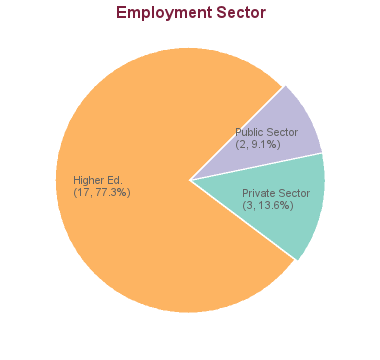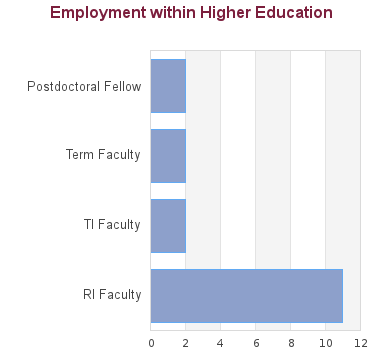
Craig Bateman
Job Title
Copy editor, legal researcher, and writing consultant
Employer
Self employed

Review details about the recently announced changes to study and work permits that apply to master’s and doctoral degree students. Read more
The PhD in Law is designed to provide advanced training for outstanding graduate students who have already obtained a Master of Laws (LLM) degree or its equivalent. The PhD is a research-intensive degree that prepares graduates for opportunities in law teaching, legal research, policy development, public and governmental service, and the practice of law.
The degree requirements include course work, comprehensive exams, a dissertation proposal and defence, a dissertation, and an oral dissertation exam. Working closely with a supervising faculty member, a student in the PhD program is expected to produce a book-length piece of original legal scholarship and of publishable quality.
The PhD provides an opportunity for focused study in a chosen field of law. It does not, of itself, qualify a holder for entry to the legal profession in British Columbia or any other certification for legal practice.
The Faculty of Graduate and Postdoctoral Studies establishes the minimum admission requirements common to all applicants, usually a minimum overall average in the B+ range (76% at UBC). The graduate program that you are applying to may have additional requirements. Please review the specific requirements for applicants with credentials from institutions in:
Each program may set higher academic minimum requirements. Please review the program website carefully to understand the program requirements. Meeting the minimum requirements does not guarantee admission as it is a competitive process.
Applicants from a university outside Canada in which English is not the primary language of instruction must provide results of an English language proficiency examination as part of their application. Tests must have been taken within the last 24 months at the time of submission of your application.
Minimum requirements for the two most common English language proficiency tests to apply to this program are listed below:
Overall score requirement: 100
Reading
25
Writing
25
Speaking
25
Listening
25
Overall score requirement: 7.0
Reading
7.0
Writing
7.0
Speaking
7.0
Listening
7.0
Some programs require additional test scores such as the Graduate Record Examination (GRE) or the Graduate Management Test (GMAT). The requirements for this program are:
The GRE is not required.
Completion of either an LLB or JD and a Masters degree.
Additionally to the required documents please submit: C.V. or resume Dissertation Proposal: PhD degrees in the Allard School of Law at UBC are dissertation-based degrees involving original research. Dissertation (PhD) proposals form an important part of the admissions process and help to guide the assignment of supervisors and supervisory committees. A proposal should outline a research project that could reasonably lead to a dissertation that makes an original scholarly contribution in the chosen field of legal study. The PhD dissertation proposal is approximately 10 pages (2,500 words), excluding bibliography. Clarity of expression is important. Please upload your thesis proposal under "Writing Sample". List of possible thesis supervisors: All applicants must submit a list indicating your first and second choice for a thesis supervisor, this list should be uploaded to your application form. There is no need to secure a thesis supervisor nor is it is necessary to contact potential thesis supervisors prior to submission of an application as many faculty members prefer that applications are referred by the Graduate Committee for their review.
All applicants have to submit transcripts from all past post-secondary study. Document submission requirements depend on whether your institution of study is within Canada or outside of Canada.
A minimum of three references are required for application to graduate programs at UBC. References should be requested from individuals who are prepared to provide a report on your academic ability and qualifications.
Many programs require a statement of interest, sometimes called a "statement of intent", "description of research interests" or something similar.
Students in research-based programs usually require a faculty member to function as their thesis supervisor. Please follow the instructions provided by each program whether applicants should contact faculty members.
Permanent Residents of Canada must provide a clear photocopy of both sides of the Permanent Resident card.
All applicants must complete an online application form and pay the application fee to be considered for admission to UBC.
Allard Hall, the home of the Peter A. Allard School of Law, was opened in 2011. The latest technology connects the Faculty with campuses, courthouses and offices around the world, and a new, state-of-the-art UBC Law Library serves as a vital academic hub for students and the legal community. Natural light, contemporary classroom designs, expanded student service spaces, a student forum space at the centre of the building, and new research spaces are all part of the new facility. The Law Library has a research collection of approximately 225,000 volumes.
| Fees | Canadian Citizen / Permanent Resident / Refugee / Diplomat | International |
|---|---|---|
| Application Fee | $116.25 | $168.25 |
| Tuition * | ||
| Installments per year | 3 | 3 |
| Tuition per installment | $1,875.34 | $3,294.66 |
| Tuition per year (plus annual increase, usually 2%-5%) | $5,626.02 | $9,883.98 |
| Int. Tuition Award (ITA) per year (if eligible) | $3,200.00 (-) | |
| Other Fees and Costs | ||
| Student Fees (yearly) | $1,144.10 (approx.) | |
| Costs of living | Estimate your costs of living with our interactive tool in order to start developing a financial plan for your graduate studies. | |
Applicants to UBC have access to a variety of funding options, including merit-based (i.e. based on your academic performance) and need-based (i.e. based on your financial situation) opportunities.
From September 2024 all full-time students in UBC-Vancouver PhD programs will be provided with a funding package of at least $24,000 for each of the first four years of their PhD. The funding package may consist of any combination of internal or external awards, teaching-related work, research assistantships, and graduate academic assistantships. Please note that many graduate programs provide funding packages that are substantially greater than $24,000 per year. Please check with your prospective graduate program for specific details of the funding provided to its PhD students.
All applicants are encouraged to review the awards listing to identify potential opportunities to fund their graduate education. The database lists merit-based scholarships and awards and allows for filtering by various criteria, such as domestic vs. international or degree level.
Many professors are able to provide Research Assistantships (GRA) from their research grants to support full-time graduate students studying under their supervision. The duties constitute part of the student's graduate degree requirements. A Graduate Research Assistantship is considered a form of fellowship for a period of graduate study and is therefore not covered by a collective agreement. Stipends vary widely, and are dependent on the field of study and the type of research grant from which the assistantship is being funded.
Graduate programs may have Teaching Assistantships available for registered full-time graduate students. Full teaching assistantships involve 12 hours work per week in preparation, lecturing, or laboratory instruction although many graduate programs offer partial TA appointments at less than 12 hours per week. Teaching assistantship rates are set by collective bargaining between the University and the Teaching Assistants' Union.
Academic Assistantships are employment opportunities to perform work that is relevant to the university or to an individual faculty member, but not to support the student’s graduate research and thesis. Wages are considered regular earnings and when paid monthly, include vacation pay.
Canadian and US applicants may qualify for governmental loans to finance their studies. Please review eligibility and types of loans.
All students may be able to access private sector or bank loans.
Many foreign governments provide support to their citizens in pursuing education abroad. International applicants should check the various governmental resources in their home country, such as the Department of Education, for available scholarships.
The possibility to pursue work to supplement income may depend on the demands the program has on students. It should be carefully weighed if work leads to prolonged program durations or whether work placements can be meaningfully embedded into a program.
International students enrolled as full-time students with a valid study permit can work on campus for unlimited hours and work off-campus for no more than 24 hours a week during academic sessions.
A good starting point to explore student jobs is the UBC Work Learn program or a Co-Op placement.
Students with taxable income in Canada may be able to claim federal or provincial tax credits.
Canadian residents with RRSP accounts may be able to use the Lifelong Learning Plan (LLP) which allows students to withdraw amounts from their registered retirement savings plan (RRSPs) to finance full-time training or education for themselves or their partner.
Please review Filing taxes in Canada on the student services website for more information.
Applicants have access to the cost estimator to develop a financial plan that takes into account various income sources and expenses.
24 students graduated between 2005 and 2013: 1 is in a non-salaried situation; for 1 we have no data (based on research conducted between Feb-May 2016). For the remaining 22 graduates:


These statistics show data for the Doctor of Philosophy in Law (PhD). Data are separated for each degree program combination. You may view data for other degree options in the respective program profile.
| 2023 | 2022 | 2021 | 2020 | 2019 | |
|---|---|---|---|---|---|
| Applications | 54 | 57 | 72 | 41 | 63 |
| Offers | 7 | 6 | 7 | 7 | 7 |
| New Registrations | 3 | 5 | 7 | 5 | 7 |
| Total Enrolment | 40 | 40 | 40 | 41 | 40 |
Students in research-based programs usually require a faculty member to function as their thesis supervisor. Please follow the instructions provided by each program whether applicants should contact faculty members.
| Year | Citation |
|---|---|
| 2012 | Dr. Nwapi examined the feasibility of bringing a criminal or civil suit in Canada, against Canadian companies, for wrongs allegedly committed overseas. He focused on the bases that Canadian courts use for exercising jurisdiction over conduct outside of this country. He found that Canada holds prospects for success in such litigation. |
| 2012 | Dr. Russo studied the unionization of migrant workers in the Seasonal Agricultural Workers Program. The unionization of farm workers in Canada is relatively recent phenomenon. Dr. Russo argues that the unique position of these workers in Canada and the framework of the program itself hampers the effectiveness of unionization. |
| 2012 | Dr. Au developed a theory to explain the development of Chinese socialist institutions from 1978 to 2011, based on case studies of Chinese legal reforms. He argues that change arose from the interplay between traditional socialist ideas and local practicalities. The research contributes to our understanding of past reforms and future policy considerations in China. |
| 2012 | Dr. Ferguson investigated the inconsistency between the claims that international human trafficking is wide spread in Canada and the small number of prosecutions that have taken place following a decade of anti-human trafficking enforcement. His research expands our collective knowledge and understanding of international human trafficking in Canada |
| 2012 | Dr. Dempsey studied evolving corporate governance regulation and standards of business conduct in multiple regimes. Her research contributes to corporate governance scholarship providing insight into ethical and legal foundations of responsible conduct and informed discourse among market, government and public stakeholders to address both financial and ethical dimensions of business. |
| 2011 | Dr. Kangave studied communities displaced by infrastructure projects such as large dams. Focusing on Uganda 's Bujagali Hydroelectric Project, she investigated the impact of resettlement through legal, economic and humanitarian lenses. She concluded that to adequately protect displaced communities, multiple layers of legal protection are essential. |
| 2010 | Dr. Fagbongbe studied women's engagement with the African regional human rights regime using a feminist Third World Approach to International Law analysis. She demonstrated the significance of adopting an interdependent and contextual understanding to the women's rights to invigorate the rights protected. Dr. Fagbongbe also emphasizes the role of stakeholders to achieve the objectives of the regime. |
| 2010 | Dr. Wang's thesis explores whether the western tradition of transparency and rule of law, which are rooted in the value of liberal democracy, can be adapted to local norms of governance in China. He found that the country's public contract law and its implementation may be partially improved to achieve the goal of good governance without fundamental changes to the country's political and judicial system. |
| 2010 | Dr. Oppong challenges the view that effective economic integration in Africa is hindered by purely socio-economic, political and infrastructural problems. He argues that radical reforms to community and national laws are needed to bring about the economic integration agenda that is essential for Africa's long-term economic growth. |
| 2010 | Dr. Iyioha introduces a theory of Integrated Governance for health systems to address disparities between health governance regimes and consumer healthcare behaviour. She proposes that Integrated governance, which incorporates non-conventional human and material resources into health systems management, can create a functional health system for reducing inequity in healthcare delivery. |
Departments/Programs may update graduate degree program details through the Faculty & Staff portal. To update contact details for application inquiries, please use this form.

Great academic programs, great location: the distinct seasons and mild climate are among the reasons why graduate students choose to study here -- from the autumn leaves to cherry blossoms, witness the many colours Vancouver has to offer.